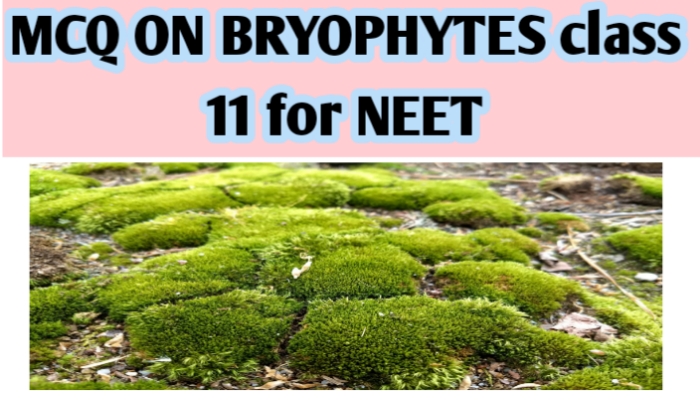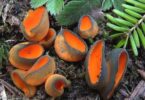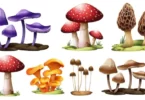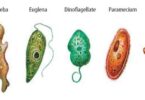MCQ ON BRYOPHYTES class 11 for NEET | MCQ ON BRYOPHYTES ON NEET Biology class 11th 2022 | MCQ Questions for class 11 Biology chapter 3 Bryophytes with answer | Check the below NCERT MCQ question for class 11 Biology chapter 3 based on BRYOPHYTES with answers.

MCQ ON BRYOPHYTES class 11 for NEET
MCQ Questions for class 11 Biology with Answers were prepared based on the latest pattern. We have provided class 11 Biology MCQs questions on BRYOPHYTES with answers to help students understand the concept very well.
MCQ on BRYOPHYTES is useful for NEET/ CSIR/ UGC/ CBSE/ ICSE /AIIMS EXAM/ JAC exam AFMC EXAM/STATE LEVEL MEDICAL EXAM 2022-23
Introduction:-
Bryophytes include the various mosses and liveworts that are found commonly growing in moist shaded areas in the hills.bryophytes are also called amphibians of the plant Kingdom .They usually occur in the damp,humid and shaded localities .They play an important role in plant succession on bare rocks/soil.
MCQ ON BRYOPHYTES for NEET
1. Amphibians of the plant Kingdom are
(a) algae
(b) bryophytes
(c) pteridophytes
(d) gymnosperm
Ans.(b) bryophytes
2. Which lack true roots,stem or leave
(a) bryophytes
b) pteridophytes
(c) gymnosperm
(d) angiosperm
Ans.(a) bryophytes
3. The main plant body of bryophytes is
(a) diploid
(b) haploid
(c) triploid
(d) tetraploid
Ans.(b) haploid
4. The male sex organ of bryophytes are
(a) antheridium
(b) archegonium
(c) sporophyte
(d) gametophyte
Ans.(a) antheridium
5.The female sex organs of bryophytes are
(a) antheridium
(b) archegonium
(c) both a and b
(d) zoospores
Ans.(b) archegonium
ALSO READ:-
● YOU CAN WATCH BIOLOGY SIR Youtube channel
6. Liverworts and mosses are found in
(a) algae
(b) pteridophytes
(c) bryophytes
(d) gymnosperms
Ans.(c) bryophytes
7. Protonema is
(a)chaploid and is found in mosses.
(b) diploid and is found in liveworts.
(c) diploid and is found in pteridophytes
(d) haploid and is found in pteridophytes.
Ans.(a) halpoid and is found in mosses
8. A plant shows thallus level of organisation.It shows rhizoids and is haploid .It needs water to complete its life cycle because the male gametes are motile . Identify the group to which it belongs to
(a) green algae
(b) pteridophytes
(c) monocots
(d) bryophytes
Ans.(d) bryophytes
9. Asexual reproduction in liveworts takes place by
(a) fragmentation of thalli
(b) formation of gemmae
(c) both a and b
(d) formation of gamete
Ans.(c) both a and b
10. Gemme are
(a) green, multicellular, asexual buds
(b) brown, unicellular sexual buds
(c) yellow, unicellular , asexual buds
(d)all the above
Ans.(a) green, multicellular asexual buds.
11.The predominant stage of the life cycle of
a moss is the
(a) sporophyte
(b) gametophyte
(c) protonema
(d) all the above
Ans.(b) gametophyte
12.Two stage of life cycle of moss are
(a) protonema ,leafy stage
(b) fragmentation,leafy stage
(c) protonema,rhizoids
(d) mannitol
Ans.(a) protonema,leafy stage
13. Funaria,polytrichum and sphagnum are
(a) mosses
(b) liveworts
(c) both a and b
(d) red algae
Ans.(c) both a and b
14. Species of a moss provide peat that have long been used as fuel.
(a) sphagnum
(b) fucoxanthin
(c) merchantia
(d) all the above
Ans.(a) sphagnum
15.They forms dense mats on the soil ,they reduce the impact of falling rain and prevent soil erosion.
(a) Mosses
(b) liverworts
(c) merchantia
(d) funaria
Ans.(a) mosses
16. Why bryophytes are called amphibians of the plant Kingdom ?
(a) these plant can live in soil but are depend on water for sexual reproduction.
(b)these plant can live in water and are depend on soil for sexual reproduction.
(c) both a and b
(d) they play important roles in plant succession.
Ans.(c) both a and b
17. Which bryophytes are of great ecological importance?
(a) mosses
(b) liveworts
(c) both a and b
(d) Gelidium
Ans.(a) mosses
18. The sporophyte of Bryophytes is usually differentiate into
(a) foot,setae , capsule
(b) rhizoids
(c) gelidium
(d) gemme
And.(a) foot,setae , capsule
19. Riccia, Merchantia, Pellia are
(a) merchantia
(b) mosses
(c) liveworts
(d) sphagnum
Ans.(c) liveworts
20. Arthoceros is
(a) mosses
(b) liveworts
(c) hornworts
(d) merchantia
Ans.(c) hornworts







Leave a Comment